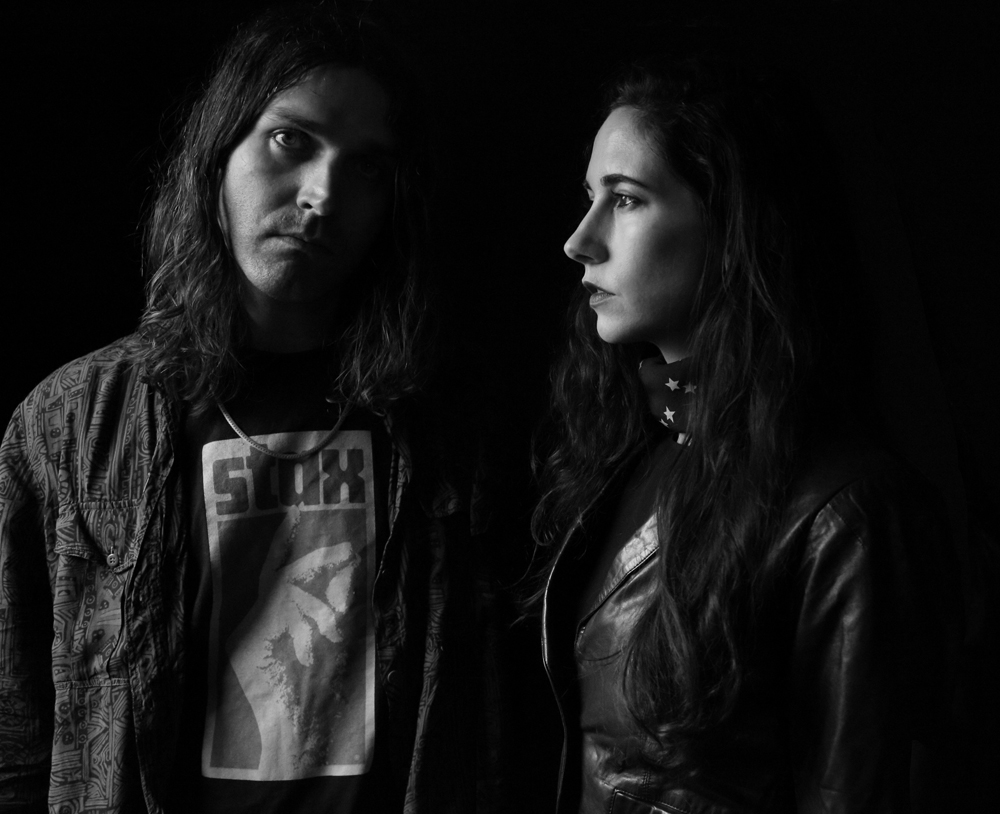Psychic Ills’ Primal Instincts

ABOVE: PSYCHIC ILLS. PHOTO COURTESY OF KENNY JOSSICK.
Comprised of Tres Warren and Elizabeth Hart, the New York band Psychic Ills continuously evolves the psychedelic-leaning sound for which they are known. On Friday, the pair released their fifth album, Inner Journey Out (Sacred Bones), presenting a 14-track cross-genre soundscape with traces of country, blues, gospel, and jazz. Elements like steel pedal guitar, Farfisa and Wurlitzer keyboards, and guest vocalists meld seamlessly with Warren’s hazy guitar and Hart’s bass. On the lead single “I Don’t Mind,” Mazzy Stars’ Hope Sandoval harmonizes with Warren, the two echoing each other, “You say I need you (I don’t need you) / I don’t think I need you (I don’t think so) / Maybe we just can’t / Let it go” above crisp guitar and fuzzed percussion. In addition to guest musicians like Sandoval and Endless Boogies’s Harry Druzd, Psychic Ills’ also collaborated with visual artists Jonah Freeman and Justin Lowe for all of the album’s artwork. The album makes it clear that although Warren and Hart have gradually adopted more traditional songwriting and recording techniques throughout their 16-year history, Psychic Ills is still not afraid to experiment.
Before the band’s record release show this Saturday at Brooklyn’s Music Hall of Williamsburg, Warren spoke with Primal Scream’s Bobby Gillespie over the phone. Primal Scream, a band with its own 34 years of impressive history and 11 albums, just released their latest effort, Chaosmosis (Ignition Records), in March. The two spoke about everything from their new records to music from the ’70s and heroin in the ’90s.
BOBBY GILLESPIE: So I’ve been listening to your album and I’ve been enjoying it.
TRES WARREN: Thanks, man. I like your album too.
GILLESPIE: Have we ever met?
WARREN: A long time ago, in Austin, Texas.
GILLESPIE: Whoa, there weren’t a lot of people at that gig. [laughs] Where do you live now? Brooklyn?
WARREN: I live in Manhattan actually, the East Village. I’ve been here for 15 years, but I’m from Texas, around Forth Worth. I also used to live in Austin.
GILLESPIE: How long did it take you to make this album?
WARREN: With writing and different bursts of activity, it took about three years to finish the whole thing. How about you?
GILLESPIE: We wrote and recorded most of the record in under a year. We’d go to the studio five days a week. Andrew Innes and myself would write and make music. We also went over to Stockholm and did some work with Björn Yttling. We record as we write; we don’t just sit down with acoustic guitars and write songs. We make music and out comes a song. That’s the way we work. How do you guys work?
WARREN: Usually, it’s similar. We make some kind of a demo and go in [the studio] and do a different, fleshed out version of it.
GILLESPIE: I love the guitar playing on your records, especially the solos. I like the lazy, “trut trut” feeling to it. It sounds simple but it’s beautiful. Is that you playing the guitar?
WARREN: Yeah, it’s me on a lot of it. There’s a pedal steel player also.
GILLESPIE: Your album One Track Mind is how I first got to know you guys. We asked you to play some dates with us, but it never happened. I don’t know if that communication ever reached you?
WARREN: We were right in the middle of trying to finish this fucking record and that’s what happened…
GILLESPIE: Ah, that’s happened to us. New Order asked us to open for them in 1993 when they did Republic. We couldn’t do it ’cause we were in Memphis trying to finish our fucking album. I was gutted.
WARREN: How was making the record in Memphis? Was that Give Out But Don’t Give Up?
GILLESPIE: Yeah, and I used to find it hard to write songs. In fact, for the whole band it was difficult making music. I don’t know why it used to be torturous—on that record particularly. There was too much structure and everything had to be guitar-oriented. Everything had to be a rock song with a guitar riff intro, verse, bridge, guitar solo—too structured for me. It wasn’t free enough. I felt confined by that way of working. From Vanishing Point onward we found a new way of composing and making music. It freed us up and got easier. We are way more confident at writing and recording and arranging. [With Give Our But Don’t Give Up] we were also trying to follow up Screamadelica, which is pretty fucking tough. We were in a bit of a mess as well.
WARREN: I remember hearing about that record and people saying, “They spent too much money,” or “They’re doing too many drugs.”
GILLESPIE: Yeah, it was a strange time. I’d say from 1990 to 1991, we had the Screamadelica time—the whole culture of clubland, which we were a part of. Clubland went from speed, ecstasy, and cocaine to heroin pretty quickly, and the band was involved with that. It definitely affected the creature of it, shall we say. You look back after a while and realize everything was meant to be, though, because you learn. You learn about yourself, you learn how you make music. You realize when you make an album that there are mistakes. When you make the next album you know what mistakes you’ve made and work through that.
Making music is an experimental process. You don’t always have to be perfect. You listen to a bunch of the first Doors and Stooges albums and think, “Shit, I want to be that perfect.” Maybe they never thought those records were any good! You just don’t know. You’re measuring yourself by these records, and when you’re young, you’re uncertain about yourself and your place in the world. You want to be cool and do good work. You’re insecure, but that’s okay.
WARREN: I always lose my mind when we’re making a record. After it’s over, it’s onto the next thing. I heard Neil Young one time say there’s something on every record he would change and I thought, “That’s Neil Fucking Young saying that.”
GILLESPIE: Oh yeah, but we can look at him now and see that he considered himself an artist. Tonight’s the Night and On the Beach were not big sellers, but he expressed himself. Only now are people looking back and thinking that they were successful records. Time changes everything. Same with Miles Davis when he was doing that electric stuff—at the time he was lambasted for it. Now people think it’s cool. When you’re young you don’t know that.
WARREN: With The [Rolling] Stones and Exile [On Main Street], everybody hated that record. How could you hate that record?
GILLESPIE: Including the Stones! [laughs] I knew Mick [Jagger] for years, and Mick would say, “There’s not any heart in [Exile].” Even Mick understood what the fuss was. Anyway, how long did it take you guys to record the record?
WARREN: We were messing around with it for about a year and a half. We recorded in New York and then we went to California, did most of the mixing, and then came back. Some things were going on at the time that caused it to take longer than it should have. It’s all right. I’m done with it. It’s nice to be finished. I’m sure you know that feeling.
GILLESPIE: Up until we released our album, which was about two months ago, it was so fucking intense. I’ve been working, working, working on this record since January 2014. I was insane. It’s only now that I can relax.
Now I’m staying out of the studio for about a year. I get to a point where I don’t want to be in a studio writing songs. I just want to be myself, spend the days doing whatever I do. I need time to get stronger and think of stuff conceptually. Words start coming to me without trying and I don’t want to force anything. Maybe if I worked for somebody else that could be cool because then the pressure’s not really on me, the creative process has already begun and you could just sharpen it.
WARREN: I think it can be good to work with other people’s stuff. You have a different relationship to it.
GILLESPIE: Yeah, it can be good! So do you guys hold jobs? Do you make a living as musicians?
WARREN: We all do this and that, except for when we’re touring. I want to [tour America], but I don’t want to do it extensively. I like touring Europe more. It’s nice to do the West Coast or the East Coast, but it’s too big to do the whole thing. There’s too many cities that you don’t need to go to.
GILLESPIE: They tried to make us do it 20 years ago and we just couldn’t. I guess the bands that do it become big. [laughs] So there’s 10 songs on the album, right?
WARREN: Fourteen.
GILLESPIE: Fourteen? Fucking hell. Why did I think it was 10?
WARREN: It’s over an hour. It could have been shorter.
GILLESPIE: I fucked up. Well, I’m going to tell you something: Iggy Pop has a radio show on BBC 6 every Friday from 7:00 until 9:00. He’s on tour so the BBC asked me if I would fill in for him. This week I’m going to play your track “I Don’t Mind” featuring Hope Sandoval.
WARREN: Cool man, thanks!
GILLESPIE: I’m not going to say what else I’m playing but you’re in good company. How is Hope? Were you friends with her before?
WARREN: We did a tour and that’s how we knew each other. We talked about doing something and I sent her that song and she sang on it. She’s got an amazing voice.
GILLESPIE: Yeah, a great voice. I can hear a lot of Spiritualized on this new album, more so than the one before.
WARREN: I was listening to Don Nix and Dennis Wilson and Dion and a lot of stuff like that. Spiritualized is a contemporary reference for sure.
GILLEPSIE: When we were in Memphis, twenty-fucking-five years ago, Andrew Innes brought a Don Nix album back and on the cover he’s wearing a Confederate hat. I never heard his music, though.
WARREN: You should check him out. He’s got a two or three records from the ’70s that are pretty good. What have you been listening to lately?
GILLESPIE: For the radio show I wanted to find some new stuff, so I listened to the DIIV album. I quite like the DIIV records. I’ve been listening to a lot of singles. This morning I was playing some ’70s rock singles that I found in the record store up the street. I’ve got an album by Cate Le Bon, Crab Day. It’s got a nice atmosphere, kind of quirky, angular guitar playing—strange, folky, erratic melodies. What are you listening to?
WARREN: A lot of reggae, Royal Trux, JJ Carroll, the same kind of shit. I want to find some new stuff. I’ve been listening to the same things. It’s cool that you’re still buying records. Do you know the store Other Music in New York?
GILLESPIE: Yes.
WARREN: They’re closing next month. It’s a bummer, man.
GILLESPIE: Oh my god. I used to go there all the time when I came to New York. During the ’90s that was a really cool shop to go to. It’s closing now? Why?
WARREN: I guess nobody’s buying music and it’s too much for the rent.
GILLESPIE: So you play live as a five-piece. Who else do you get to record?
WARREN: A lot of different people—some session people playing pedal steel, we had gospel singers. There are some friends here and there, one of them was a guy in New York, and another one was in L.A., where I’m mixing. Thom Monahan mixed it. He’s good. He’s done Beachwood Sparks.
GILLESPIE: I love Beachwood Sparks. I love the album Tarnished Gold.
WARREN: That’s the one he did.
GILLESPIE: That’s amazing. It’s like they became a different band. I thought it was the best record they’ve ever made. Why did you choose to work with Thom?
WARREN: I wanted to give it to somebody and not have to micromanage all of the mixing. It seemed like he would be the right person. I was present [during the mixing], but I stayed out of the studio. I wanted to let him do his thing.
GILLESPIE: That’s a good way of working. If somebody’s a good mixer, just stay out of the studio and go in at the end of the day to listen. It’s hard to work with somebody over your shoulder all the fucking time.
WARREN: And then it’s like, why are you getting him to do it, if you can already do it?
GILLESPIE: I’ve never met a musician who can mix. They all think they can, but when people try to do it themselves, they always make flat records. You’ve got to let somebody else do it, I think. That’s my opinion, anyway. [pauses] So how do you feel about the music scene now?
WARREN: I don’t know…
GILLESPIE: You don’t even know what the music scene is, right? I don’t.
WARREN: I just kind of listen to what I like.
GILLESPIE: It’s funny how things ebb and flow. A few really good things come out of a year, but if you go to Rough Trade, the amount of independent or alternative music, plus the stuff that’s been reissued, is an avalanche. People out there are making good stuff, but not everybody… When you play live, do you mess around with the arrangements of the songs?
WARREN: Some, a little bit. How about you?
GILLESPIE: Yeah, we always change them. We try and take what the studio creates and make it work in a live, high energy, rock ‘n’ roll sound. The songs become harder, faster. As long as it’s a good song, you can do a lot of things with it. Also, I don’t what to play it perfect with the album. I think that’s boring.
WARREN: I don’t know what else to say.
GILLESPIE: Me neither. That was cool.
WARREN: Thanks a lot.
FOR MORE ON PSYCHIC ILLS, CLICK HERE, AND FOR MORE ON PRIMAL SCREAM, CLICK HERE.






